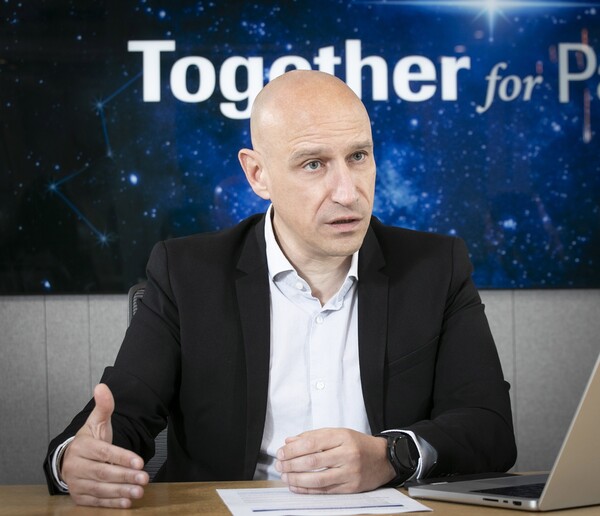For over twenty years, Roche has been a trailblazer in hematology, revolutionizing lymphoma treatment with a series of groundbreaking therapies. The journey began with the introduction of Mabthera (rituximab), the first CD20 antibody, marking a significant milestone in cancer care. Since then, Roche has consistently introduced advanced treatments like Gazyva (obinutuzumab), Polivy (polatuzumab vedotin), Columvi (glofitamab), and Lunsumio (mosunetuzumab).

Korea Biomedical Review recently met with Georgios Spitadakis, Hematology Integrated Disease Solution Lead at Roche, and Michelle Boyer, Head of Hematology Product Development at Roche, to discuss the company's sustained focus on lymphoma, its innovative approaches, and its commitment to collaboration with the Korean medical community.
Boyer emphasized Roche's longstanding leadership in lymphoma. "Roche has led the market with Mabthera for over 20 years, and we are committed to addressing the unmet needs in lymphoma treatment," Boyer said. "Roche's extensive experience in lymphoma allows the company to continually innovate, offering groundbreaking therapies such as bispecific antibodies and antibody-drug conjugates (ADCs)."
Spitadakis outlined Roche's strategic approach to innovation, emphasizing three key areas: developing breakthrough therapies to address unmet medical needs, improving the patient treatment experience, and providing options to minimize disease relapse and progression.
"Our ambition is to increase cure rates in the first line. In later lines, we want to ensure that disease progression is under control so patients can live their lives to the fullest," Spitadakis said.
Diffuse Large B-Cell Lymphoma (DLBCL) remains a significant focus for Roche, with approximately 60 percent of patients achieving a cure with first-line treatments, while 40 percent relapse or become refractory. Spitadakis explained that Roche's goal is to increase cure rates in the first line by developing innovative therapies such as the Pola-R-CHP regimen, which combines Polivy with R-CHP (rituximab, cyclophosphamide, doxorubicin, and prednisone).
Boyer noted the heterogeneity of DLBCL and the importance of treating patients effectively in the first line. "Once DLBCL progresses, resistant mechanisms come into play," Boyer said. "That's why we need multiple modalities and combinations to target all patients and segments of patients." Roche is committed to translating groundbreaking science into medicines, offering patients multiple options based on their disease, biology, and treatment stage.
Despite challenges in demonstrating overall survival (OS) benefits in the POLARIX study, a phase 3 clinical trial evaluating Polivy+R-CHP versus R-CHOP (rituximab, cyclophosphamide, doxorubicin, vincristine, and prednisone), Roche has focused on progression-free survival (PFS) at 24 months (PFS24) as a crucial endpoint. "The POLARIX study showed a 7 percent improvement in PFS24 and a 27 percent reduction in the risk of progression, relapse, or death with Pola-R-CHP compared to R-CHOP," Spitadakis noted.
However, the Korean government remains hesitant about the overall survival benefit of the Pola-R-CHP regimen, leading to its failure to pass the Cancer Drugs Benefit Appraisal Committee, the first gateway to reimbursement in Korea. Boyer and Spitadakis emphasized the benefits of the Pola-R-CHP regimen, focusing on PFS24 as an important measure of long-term benefit. Spitadakis noted that Polivy has been approved in over 90 countries and included in many clinical guidelines, benefiting at least 23,000 patients to date.
"The second line is increasingly challenging for showing OS improvement," Spitadakis said. "Effective first-line treatments for DLBCL could also help reduce the economic burden associated with disease progression." Demonstrating the real-world benefits and safety profile of Polivy, including global usage patterns and positive outcomes in clinical guidelines, is crucial for gaining acceptance from healthcare professionals and the government.
The role of bispecific antibodies in lymphoma treatment
Roche's recent approval of bispecific antibodies, Columvi and Lunsumio, in Korea marks a significant advancement in the treatment of relapsed and refractory lymphomas. These bispecific antibodies target CD20 and CD3, offering new treatment options for patients. Spitadakis and Boyer explained the strategic use of two different medications with similar mechanisms for different indications.

"The biology of lymphomas is complex, and the pathophysiology can change as the disease progresses," Spitadakis said. "Therefore, it is important to develop combinations that address the evolving disease biology and patient needs at each line." He highlighted the tailored approach of Roche's bispecifics for specific settings, such as outpatient treatments where hospitalization is not possible.
Boyer added, "DLBCL is a very aggressive disease, while FL (follicular lymphoma) and CLL (chronic lymphocytic leukemia) are more indolent. There is a different tolerance for treatments in these settings." Columvi, with its higher CRS (cytokine release syndrome) rate, requires management with steroids and Gazyva pre-treatment, making it suitable for aggressive DLBCL. Lunsumio's potential subcutaneous formulation and excellent safety profile make it well-suited for indolent diseases like FL and CLL, where tolerability and convenience are critical.
In Korea, accessing CAR-T therapies is challenging, with availability only in the third-line setting, adding a burden on the healthcare sector. Spitadakis emphasized that while there are no head-to-head comparisons between CAR-T and bispecifics, Columvi has shown very good complete response rates in heavily pretreated patients, including those refractory to CAR-T. Boyer stressed the immediate availability of bispecific antibodies, offering significant benefits to healthcare systems globally.
Commitment to R&D and local collaboration
During the interview, Boyer highlighted Roche's commitment to collaboration with Korean researchers and medical academies. "Korean researchers have been involved early in the development of our bispecific antibodies," she said. "Clinical trial participation is crucial for providing innovative treatments to patients and for gaining valuable insights. We value the expertise provided here in Korea."

Despite regulatory barriers, Boyer stressed Roche's efforts to involve Korean investigators in early-phase clinical trials. "It's important for us to understand the barriers in each country and find ways to influence and help them," she said. "Roche's commitment to innovation and collaboration remains steadfast as it leads to lymphoma treatment."
Spitadakis concluded by emphasizing the unique opportunity for collaboration among the Korean medical community, government, and pharmaceutical industry to revolutionize DLBCL treatment. "We have made significant breakthroughs in recent years, and now is the time to ensure these innovative therapies reach patients and improve their outcomes," he said. "We aspire to cure patients with DLBCL and are passionate about helping patients in later stages of disease management."
Boyer reaffirmed Roche's commitment, stating, "Our vision is to cure every patient. We believe it's important for Korean patients and the government to allow the opportunity for patients to receive the best treatments in the first-line setting." She emphasized the importance of continuous collaboration with Korean counterparts.
Related articles
- Roche Korea appoints Ezat Azem as new general manager
- Roche Korea shares latest blood cancer treatment strategies using Columvi, Lunsumio
- Could Roche’s lymphoma drug Columvi be a rival against Novartis’ Kymriah?
- Roche Korea names Kang Hyun-ju as new A&P Cluster lead
- Will the release of Lunsumio’s 3-year data open way for reimbursement?

